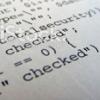Pragmatic Programmer and Code Complete is for after you get a solid understanding of any programming language (they aren't language specific). Design Patterns (by the "gang of four") is another "after you get the basics down solidly" book.
Can you help me with the rest of the books I didn't place yet? Just quote and add a T1, T2 and so on, depending on which book you think should be in whatever tier. Also, if you feel as some books are redundant, please mark! Let's remember, we are talking about game programming.
You really don't need a bajillion books.
Since alot of those books have major overlaps, you get heavily diminishing returns for each additional book you buy on the same subject matter.
After you work through two of those books, you'll have a better understanding of what you've learned and what you haven't yet understood. The things you have trouble understanding would then best be learned through questions and discussion on these forums, and sub-topics and new topics you haven't yet explored can be recommended, and books targeting those new topics/subtopics can be recommended.
Even if someone offered you all those books for free, I wouldn't bother reading more than two of them before re-evaluating. You'll likely find that after you read two or three of them, 90% of the remainders will not be worth purchasing, and not even be worth the time it takes to read them, because it merely re-covers material you already understand well.
Basically, the books you listed fall into three categories: Beginner C++, Intermediate C++, and intermediate general programming.
The three I mentioned are important books to read irregardless of what languages you know - the information applies to dozens of different languages (but is irrelevant for some other languages).
Intermediate General Programming books:
- Code Complete 2nd Edition
- Pragmatic Programmer
- Design Patterns
(Another commonly mentioned is Mythical Man-month, but that's more team-focused, and I wouldn't recommend it as any kind of priority. It teaches more programming-team management rather than programming itself)
Then you have all these C++ ones. Which ones are "beginner" and which ones are "intermediate", I don't know.
Beginner or intermediate C++-focused books:
- Bjarne's Programming: Principles and Practice Using C++
- Bjarne's The C++ Programming Language 4th ed.
- Practice in C++ 2nd ed.
- Jumping into C++" by Alex Allain
- Jossuttis' The C++ Standard Library
- The C++ Programming Language reference book
- Lippman's C++ Primer 5th edition
- Programming: Principles and Practice Using C++ 2nd Edition
- The C++ Standard Library: A Tutorial and Reference
- The C++ Programming Language (as a reference)
- Scott Meyers Effective C++
- Scott Meyers More Effective C++
- Scott Meyers Effective STL
- Scott Meyers Effective Modern C++
- Scott Meyers Effective Modern C++, 2014
Of this second list, I'd suggest getting two beginner ones, and after reading them, re-evaluate what gaps you still have in your knowledge, and which gaps should get priority in being filled.
And even while reading these books, you still need to practice actually coding, and ask questions on the forums, and read other peoples' discussions even on questions you didn't ask.









